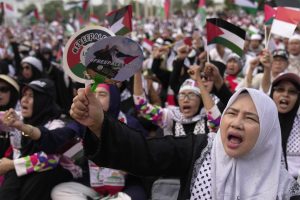Over the weekend, protesters in Indonesia and Malaysia gathered in large numbers to express their support for Palestine and protest the looming Israeli ground offensive against the Gaza Strip.
The protests were among the many that have erupted across the Muslim world and beyond, as the Israeli Defense Force prepares to respond to the surprise incursions by the militant group Hamas into southern Israel, during which armed men killed more than 1,000 Israeli civilians.
In the Malaysian capital Kuala Lumpur, a crowd of around 15,000 assembled after Friday prayers to condemn Israel’s air attacks and impending land assault on Gaza. According to the Malay Mail, protesters wore Palestinian keffiyeh scarves and held aloft placards reading Israel cuak (“Israel is frightened”). It reported that two effigies draped in the Israeli flag were also set ablaze amidst chants of Hidup Palestin (“long live Palestine”) and Hancur Zionist (“crush the Zionists”).
Attending was a number of prominent politicians from both sides of the political spectrum, including former prime ministers Muhyiddin Yassin and Mahathir Mohamad. Also attending were the leaders from the Islamic party PAS, the National Trust Party, the majority ethnic Chinese Democratic Action Party, and the United Malays National Organization, and a number of members of Prime Minister Anwar Ibrahim’s cabinet.
“For decades they have suffered,” Muhyiddin told the crowd. “Today’s gathering is a testament to our unwavering stance, regardless of political affiliations or whether you are Muslim or non-Muslim, we must make our stance known against the atrocities of the Zionist regime imposed upon the Palestinians.”
According to the Straits Times, rallies were reportedly also held in other mosques across Malaysia “in a show of support for the Palestinians”, and mosques across Malaysia conducted “prayer of need” for Palestine. The Friday sermon in many mosques around Malaysia focused on solidarity with the Palestinian cause, and denounced Israeli’s “Zionist regime.”
On the same day in Indonesia, thousands of citizens in Jakarta held protests at which they denounced Israel as the “real terrorist,” according to a report by the Spanish news agency EFE. Labor groups also gathered in front of the U.S. embassy in Jakarta this week, urging President Joe Biden not to support the Israeli attack on Gaza.
This pro-Palestine orientation has also been reflected in the two nations’ responses to last week’s brutal Hamas incursions into southern Israel, which in turn reflect their long track record of support for the Palestinian cause, particularly in Indonesia, where it is closely conjoined to the country’s own anti-colonial struggle. Indonesia’s Ministry of Foreign Affairs called for an “immediate end of violence” and said that “the root of the conflict, namely the occupation of the Palestinian territories by Israel, must be resolved, in accordance with the parameters agreed upon by the U.N.” The sentiment was later echoed by President Joko Widodo.
Malaysia’s government made much the same point, calling out what it described as the world’s “flagrant hypocrisy in dealing with any regime [Israel] that practices apartheid and blatantly violates human rights and international law.” It said that the “root cause” of the Hamas attack “must be acknowledged.” Brunei’s Foreign Ministry made a similar point, calling for “urgent action to create an environment conducive to peace talks without delay.” It added, “The plight of the Palestinians remains at the core of the conflict in the Middle East.”
These protests, especially the bipartisan gathering held in Kuala Lumpur, underline an obvious but important point. “While these views are not new,” Natalie Sambhi wrote last week for the Brookings Institution, “their expression is a reminder of how the sentiments of some states in the Global South are shaped by history and postcolonial solidarity.”
As a result, while many Western leaders have voiced strong support for Israel, and its right to respond to Hamas’ attacks with whatever force it feels is necessary, the balance of both public and elite opinion in Muslim-majority Southeast Asia, as in much of the Muslim world, is very much on the opposite side.

































